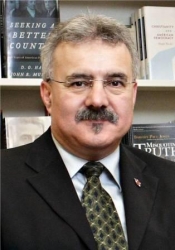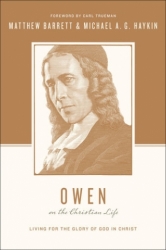Welcome again to Books At a Glance! I’m Fred Zaspel, and Dr. Michael Haykin is our guest once again, talking to us again about the Genevan Reformer, John Calvin. This time we’ll look into the personal side of Calvin.
Zaspel:
Michael, how did Calvin become an evangelical?
Haykin:
I think, first of all, it’s important to note that the term, the way in which your question was phrased is appropriate. There will be some who might take umbrage at the use of the term evangelical in the 16th century; but the word evangelical is very, very appropriate for that period. Erasmus uses the term, for example, to refer to Luther in 1525; and a lot of Protestant or Evangelical historians or historians looking at the Reformation used the term evangelical of many of the figures in the 1520s through the 1550s.
So, how did Calvin become an evangelical? Well, one of the challenges in trying to determine this or answer this is the issue of date. It’s not clear at all when Calvin was actually converted. That there was a conversion is definitely true. Again, this has become an issue among some Reformed believers who are arguing that the idea of conversion is a later element in the history of Evangelicalism – 18th century. But Calvin definitely talks about his conversion in his preface to The Psalms, which was published in 1557. The only problem is that the dating is not clear. The traditional dating is around 1534. More recently a number of scholars, including T. H. L. Parker, who was a very well-known Calvin scholar, followed by J. I. Packer, the very well-known evangelicalist theologian, have argued for an earlier date, dating around 1529, even 1530, partly because their argument would be that within two years of Calvin’s conversion, if he was converted in 1534, he has written The Institutes. And they find it hard to believe that a work of such maturity could come from a young Christian. I think there is good evidence, which we needn’t go into at this point, for dating it in 1534.
In his account of his conversion, which we know is his conversion – he specifies it that way – in his preface to the Commentary on the Psalms, Calvin indicates that a number of elements went into that conversion. It’s a very lapidary account (one would wish that it was longer – the sort of accounts that came from Luther’s hand); but it is what we have. There definitely was a conversion; it was an evangelical conversion; and it has certain elements that we can look at.
Zaspel:
Were there key elements of the conversion story that you can tell us about?
Haykin:
Yes, as I said, there are certain elements there that could be noted. He talks about being trapped, as it were, or in bondage to papal superstition. And he compares his bondage in that regard to being trapped in a bog. A bog is very common in Europe: it’s like quicksand, but it’s rotting vegetation and there’s no solid ground. If you fall into this, you will be sucked in and destroyed. It’s a very vivid illustration of what Calvin came to see as the superstitions of the papacy – that they would have destroyed him spiritually.
Then he talks about being suddenly awakened; and the word suddenly can also be translated unexpectedly. It’s the Latin word subito, and probably Calvin’s intent is the idea that he didn’t intend to become an evangelical. He had a deep love for the unity of the church. This pervades his entire thought after his conversion, but especially hindered him from coming to Christ. But he said, “God subdued my frame,” which was surprisingly rigid, given his youth. If he was converted around 1534, he was in his early 20s, around 25, because he was born in 1509. So, he talks about conversion being a process of being subdued, of being made teachable. It’s a very important thing for Calvin. He doesn’t believe that a man can take up the role of pastoral ministry unless he is teachable. You have to be teachable. And I think that has much to say to our own day.
Then, lest one think that his conversion was merely intellectual, he says, “I was inflamed to such a desire for the study of theology” that his other studies (he was studying law at the time), he only did as he had to do it in order to ultimately get his law degree. But he talks here about the way in which the theology had gripped him. In another place, in his first edition of his Institutes, he actually talks about how doctrine is not a matter of the tongue, but of life. It’s not apprehended only by the intellect and memory like other branches of learning but is received only when it possesses the whole soul. “The Gospel ought to penetrate the innermost feelings of the heart, fix its seat in the soul and pervade the entire person a hundred more times than the frigid writings of the philosophers.” That’s a quote from the Institutes, the 1539 edition. And it indicates that, for Calvin, a conversion was both illumination and the warming of the heart. It’s not one or the other, but both together.
Zaspel:
Amen.
On another curious historical note, earlier on you said that some object to the term evangelical with reference to Calvin or Luther or whomever; so, what was the meaning and the significance of the term in his own day?
Haykin:
Well, the term came to mean those who prized the Gospel, those who were Gospel men, and for whom the Gospel was the rule of life, as it were, as opposed to those who emphasized the Scriptures and Tradition. In other words, there is a debate both historical and theological about whether or not the term evangelical is an appropriate term to use prior to the 18th century. Can it be used, for example, of the Puritans of the 17th century? Can it be used of the Reformers? And there are historical debates about that and there’s theological debates; and I would definitely have the view that there is significant continuity between the Reformers and us who are Evangelicals. And the emphasis among Evangelicals, since the 18th century, upon conversion is not something foreign to the Puritans or to the Reformers. Some theologians and historians have been emphasizing that there is more discontinuity between the Reformers and Puritans on one hand, and Evangelicals on the other, than continuity. I’m not convinced that that’s true.
Zaspel:
The meaning then focused both on the content theologically, in terms of justification by faith, and the sufficiency of Scripture, and things like that, but then also on the importance of conversion?
Haykin:
Yes. Conversion would be one element of continuity. Biblical authority would be another element. Justification by faith alone would be another element. The Great Awakening begins with the preaching of justification by faith. Whitfield is doing that within a year or two of his conversion; Edwards, in the fall of 1534, has a long series on justification. One of the earliest reports that we have of Charles Wesley preaching, by a man named Joseph Williams, who was a merchant from Kidderminster, is hearing him preach about justification by faith. So, the Reformation doctrines are all reprised, retooled, for the 18th century. There is significant continuity that we should not overlook.
Zaspel:
We’re talking to Dr. Michael Haykin, Professor of Church History at The Southern Baptist Theological Seminary and author of many books related to church history that you can check out here on our page. We hope you’ll join us next time as Dr. Haykin talks to us about the work of John Calvin in Geneva.
Michael, many thanks for your good help.
Editor’s Note: You’ll want to check out more interviews with Dr. Haykin where he talks about John Calvin here, here, and here.
Editor’s Note: You’ll want to check out these church history related titles from Dr. Haykin.
Books by Michael Haykin
The Advent of Evangelicalism: Exploring Historical Continuities
Amazon (Paperback)
To the Ends of the Earth: Calvin’s Missional Vision and Legacy
The Revived Puritan: The Spirituality of George Whitefield (Classics of Reformed Spirituality)
Amazon (Paperback)
The Baptist Story: From English Sect to Global Movement
The Christian Lover: The Sweetness of Love and Marriage in the Letters of Believers
Pentecostal Outpourings: Revival and the Reformed Tradition
The Reformers and Puritans as Spiritual Mentors: Hope Is Kindled (Christian Mentor)
Patrick of Ireland: His Life and Impact (Biography)
Rediscovering the Church Fathers: Who They Were and How They Shaped the Church
Eight Women of Faith
Amazon (Paperback) (Kindle) (Audiobook) (Audio CD)
Soldiers of Christ
Amazon (Paperback)
Jonathan Edwards: The Holy Spirit in Revival (Emmaus)
Amazon (Paperback)
Defence of the Truth: Contending for the Faith Yesterday and Today
Amazon (Paperback)
Ardent Love for Jesus: English Baptists and the Experience of Revival in the Long Eighteenth Century
Amazon (Paperback)
Kiffin Knollys & Keach: Rediscovering English Baptist Heritage
Amazon (Paperback)
A Cloud of Witnesses: Calvinistic Baptists in the 18th Century
Amazon (Paperback)
Bitesize Biographies: George Whitefield
Amazon (Paperback)
Devoted to the Service of the Temple: Piety, Persecution, and Ministry in the Writings of Hercules Collins (Profiles in Reformed Spirituality)
Travel with Jonathan Edwards
Amazon (Paperback)
Joy Unspeakable and Full of Glory: The Piety of Samuel and Sarah Pearce (Classics of Reformed Spirituality)
Amazon (Paperback)
A Consuming Fire: The Piety of Alexander Whyte
Baptists and War: Essays on Baptists and Military Conflict, 1640s-1990s
Amazon (Paperback) (Hardcover) (Kindle)
A Heart for Missions: Memoir of Samuel Pearce
Amazon (Paperback)
A Sweet Flame: Piety in the Letters of Jonathan Edwards (Profiles in Reformed Spirituality)
Waiting on the Spirit of Promise: The Life and Theology of Suffering of Abraham Cheare (Monographs in Baptist History)
Amazon (Paperback) (Hardcover) (Kindle)
Christ Is All: The Piety of Horatius Bonar (Profiles in Reformed Spirituality)
The Armies of the Lamb: The Spirituality of Andrew Fuller (Classics of Reformed Spirituality)
Amazon (Paperback)
To Honour God: The Spirituality of Oliver Cromwell (Classics of Reformed Spirituality)
Amazon (Paperback)
An Orthodox Catechism
The Empire of the Holy Spirit
Amazon (Kindle)
“The First Counsellor of our Denomination”: Studies in the Life and Ministry of Abraham Booth
Amazon (Kindle)
Church History 101: The Highlights of Twenty Centuries
Amazon (Paperback) (Kindle) (Audiobook) (Audio CD)
Owen on the Christian Life: Living for the Glory of God in Christ
The British Particular Baptists, Vol. 1: 1638 – 1910
Amazon (Hardcover)
The British Particular Baptists Vol. II: 1638-1910
Amazon (Hardcover)

